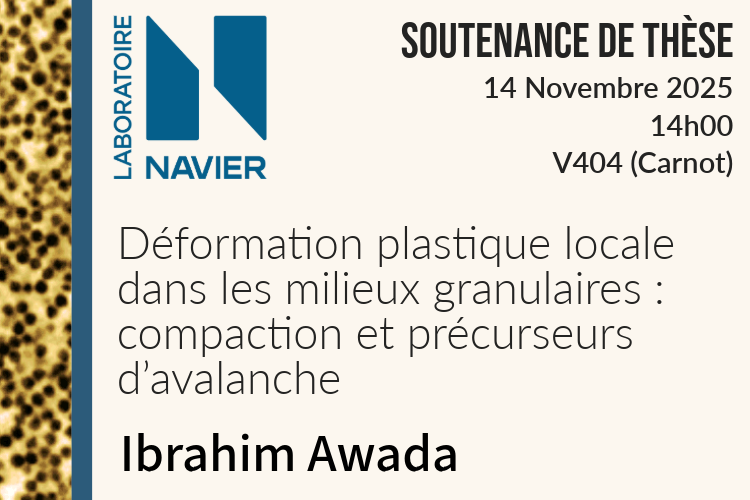
PhD defense – Ibrahim Awada
- Post by: Julien Léopoldès
- 6 November 2025
- No Comment
Ibrahim Awada, a PhD candidate in the RMP team, will defend his dissertation titled “Local plastic strain in granular media: compaction and avalanche precursors" on Friday, November 14, at 2:00 PM, in room V404 (Carnot building).
Composition of the jury :
- Michel Bornert, ENPC – Co-supervisor
- Luca Cipelletti, Université de Montpellier – Reviewer
- Djimedo Kondo, Sorbonne Université – Examiner
- Vincent Langlois, Université Gustave Eiffel – Co-supervisor
- Julien Léopoldès, Université Gustave Eiffel – Supervisor
- Vincent Richefeu, Université Grenoble Alpes – Reviewer
- Anne Tanguy, INSA Lyon – Examiner
The defense will be broadcasted live on Microsoft Teams. You can follow it here:
https://univ-eiffel.zoom.us/j/88909253454
Meeting ID: 889 0925 3454
Password: DjZuWDU5
Abstract
Show the abstract
In general, the macroscopic plastic deformation — the irreversible part of a material’s total strain — results from rearrangements within its microstructure. In granular materials, the nature of these rearrangements remains difficult to define. To better understand the underlying processes, we developed an experimental method to track the microscopic deformation of a granular packing during loading (in an inclined or vibrated configuration). This approach combines two complementary measurements: correlation of multiply scattered ultrasonic signals (Diffusive Acoustic Wave Spectroscopy, DAWS) and optical tracking of grain displacements. Our observations during loading– unloading cycles reveal the presence of a memory effect (distinct from elasticity) and a second effect related to the degree of reversibility of strain fluctuations. The combination of these two effects gives rise to a robust relationship between the mean plastic strain and its local fluctuations, which is independent of both the frequency and the type of mechanical loading. Finally, when the granular medium is inclined up to avalanche onset, we show that the number and intensity of precursory failure events are strongly influenced by the geometry of the packing and its compatibility with the applied load. Our results make it possible to assess the active or passive role of the precursor regarding to the avalanche.


